The Feminine Touch (1941)

via: http://www.rozrussell.com/2014/07/the-feminine-touch-1941.html Unless otherwise noted, all images are my own.
Jealousy takes center stage in this comedy from 1941 starring Rosalind Russell and Don Ameche. The two romantic leads are already married to each other when the movie begins, so you know that this film will challenge their union. And what better way to question one’s marriage than by bringing in some love rivals!
That’s where Van Heflin and Kay Francis come in. They play an almost-couple who become embroiled in the marital problems of Russell and Ameche.
Although Heflin was relatively new to Hollywood, Francis was about as experienced as they come. She started in movies in 1929 and by 1932 she was the Queen of Warner Bros. She is perhaps most famous for the classic film Trouble in Paradise (1932), and for having a lisp: she sometimes pronounced the letters “L” and “R” as “W.” She was also known for portraying glamorous women in gorgeous clothes, and she lives up to that image in this film, thanks to MGM’s resident costume designer, Adrian.
But after ruling Hollywood for several years, Francis fell out of favor with audiences, and in 1938 she was deemed “box office poison” in the same ad that included Fred Astaire and Katharine Hepburn. She ended her contract with Warner Bros. the next year, and began freelancing. She would make only six more movies after this one.
Francis was nearing the end of her stellar career, but Rosalind Russell was just beginning her rise to stardom. She’d appeared in movies since 1934, but MGM exec Irving Thalberg apparently saw Russell mostly as a Myrna Loy replacement in case Loy either couldn’t work or got too powerful and needed to be brought down a peg. But Russell’s memorable role in The Women (1939) showed she was a star in her own right. With His Girl Friday (1940), which Russell made on loan to Columbia, she cemented her reputation as a gifted actress with a flair for comedy.
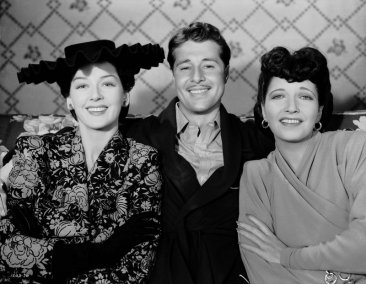
Russell, Ameche, and Francis via: http://www.tcm.com/tcmdb/title/881/The-Feminine-Touch/#tcmarcp-650278-650283
Like Russell, Don Ameche had been in Hollywood since the mid-1930s: he had two uncredited appearances in films in 1935 before his career took off in 1936. By the time he made this movie, he was a solid property at 20th Century Fox starring in a variety of films including Moon Over Miami (1941), Down Argentine Way (1940), and Midnight (1939). He was loaned to MGM to make this movie, though I’m a little unclear why. Judge for yourself, but such a charming, smooth actor seems out of place as a stodgy, emotionless professor.
 Rounding out the cast is Van Heflin. Despite copious screen time and an endearing portrayal of a fun character, you’ll notice that Heflin gets secondary billing. For instance, on the poster he’s placed right above legendary character actor Donald Meek, who appears in the movie very briefly as a ferry man.
Rounding out the cast is Van Heflin. Despite copious screen time and an endearing portrayal of a fun character, you’ll notice that Heflin gets secondary billing. For instance, on the poster he’s placed right above legendary character actor Donald Meek, who appears in the movie very briefly as a ferry man.
Heflin had been under contract to RKO in the mid-1930s, appearing in five films. But he got his big break on stage in The Philadelphia Story (1939) playing Macauley Connor opposite Katharine Hepburn and Joseph Cotten. (That part would be played by James Stewart in the 1941 film adaptation, and by Frank Sinatra in the musical version, High Society (1956).)
Heflin’s performance in the play got him a contract with MGM. This time, his movie career took off. He won a Best Supporting Actor Oscar for his work in Johnny Eager (1941), which came out the same year as The Feminine Touch, and he worked steadily through the 1960s. But he wasn’t a star yet, which explains his tiny name on the poster, and his absence on the main title screen.
W.S. Van Dyke, who you might know from The Thin Man movies, directed this film. He was famous for being a speedy, reliable director, and he earned the nickname “One-Take Woody” (his first name was Woodbridge) because he usually didn’t do multiple takes, and he finished shooting his films early or on-time.
To the film! We open The Feminine Touch (a strange title that seems picked out of a hat; this film had the working titles Heartburn, All Woman, and Female of the Species,) on Digby College, where the all-male student population has pledged not to shave until their football team beats their rival college, Laurel. So immediately we know that this is an institution that cares about athletics.
Or at least the students do, and it seems that the faculty do, too, except for John Hathaway, the Professor of Psychology (Don Ameche). He is fed up with teaching empty-headed students who care far more about football than their academics. (Something about the academics/athletics dichotomy seems awfully familiar…)
 One student, a star football player nicknamed Rubber-Legs (Gordon Jones), annoys John the most. He’s especially stupid and especially good at football, so John is under pressure to keep him eligible to play even when he’s failing in the classroom. (Again, it’s a good thing this never happens in our enlightened age!)
One student, a star football player nicknamed Rubber-Legs (Gordon Jones), annoys John the most. He’s especially stupid and especially good at football, so John is under pressure to keep him eligible to play even when he’s failing in the classroom. (Again, it’s a good thing this never happens in our enlightened age!)
When John threatens to keep Rubber-Legs out of the big game on Saturday because he didn’t pass the exam, Rubber-Legs reacts in utter shock: “Why, they’d tear down the stadium!” he says. John answers, “Then maybe they’d rebuild the library they tore down to build the stadium.” Yikes.
Rubber-Legs doesn’t help his case by displaying obvious signs of a crush on John’s wife, Julie. He even carves their initials into his desk–in John’s classroom!–so, yeah, he’s not the brightest bulb. But John seems far more bothered by Rubber-Legs’ lack of interest in his studies than any romantic issue.
After class John is summoned to the dean, so Rubber-Legs sneaks off to pick up Julie at the train station. She is coming back into town after a visit with her mother. She expertly and lightheartedly deflects any romantic overtures the clumsy student attempts. Julie is clearly devoted to her husband.
Meanwhile, John is having an unpleasant chat with the dean. Although the dean professes to share John’s discomfort with the football situation, he also hints that Rubber-Legs must play on Saturday. He’s getting pressure from the Board, you understand. John explains that Rubber-Legs turned in an empty paper for his exam and didn’t even spell his name right for partial credit! (We’ve been fighting the athletics/academics fight for a long time, ladies and gentleman.)
The dean says that Rubber-Legs still needs to play. So John says he will do his best, but on his way out he makes a Nazi salute and shouts “Heil Football!” before goose-stepping out of the office. Again, yikes! It’s a strong statement, but intended to be comic. This film was in production in the summer of 1941 and released in October, so audiences were probably familiar with the Nazi salute and march. The scene is shocking for modern viewers, but remember that when this was filmed and released, the US hadn’t gotten into the war yet, Pearl Harbor was months away, and the full horror of WWII and the Nazis wasn’t yet in the mainstream.
Anyway, John goes home where he meets his beloved wife, Julie (Rosalind Russell). They’re very happy to see each other.
He tells her that he has made excellent progress on his book, “Jealousy in All its Aspects and Universal Applications.” She’s thrilled, though she seems unable to remember the correct title, usually switching the “Aspects” and “Applications” when she mentions it. She’s mostly worried, though, that he hasn’t been sleeping or eating well in her absence. Also, he’s really bad at knowing when his coffee is cool enough to drink, and she’s very concerned that he may have burned his mouth when she was gone.
 She tells him that Rubber-Legs picked her up at the station and tried to make a move on her. But he doesn’t seem mad or jealous at all, and when she asks him why, he reminds her of his book, which is a very rational exploration of jealousy that proves it is a useless feeling. But she rather wishes he wouldn’t be so rational all the time, nor take her for granted quite so much.
She tells him that Rubber-Legs picked her up at the station and tried to make a move on her. But he doesn’t seem mad or jealous at all, and when she asks him why, he reminds her of his book, which is a very rational exploration of jealousy that proves it is a useless feeling. But she rather wishes he wouldn’t be so rational all the time, nor take her for granted quite so much.
In fact, they get in a fight about it. Or she gets upset, throws his book, and cries. And he just waits until she is finished, says “It’s all over now” in an incredibly patronizing tone, and then takes her in his arms while she apologizes.
We’ll stop right there. The movie has taken pains to immediately set up this pair as Rational/Emotional, Smart/Silly, Male/Female. Julie isn’t smart enough to understand his book–remember, she couldn’t even remember the title!–and she’s definitely the more emotional and irrational of the pair. And he’s smugly superior. It’s the worst.
First, it’s an unpleasantly old-fashioned depiction of male/female dynamics. Second, it’s perhaps more unpleasant because Rosalind Russell usually plays smart, tough, confident, fast-talking characters (see His Girl Friday (1940) for the archetype, but also My Sister Eileen (1942), Auntie Mame (1958), The Women (1939), etc.) So Russell as the “little woman” who admits her husband is much, much smarter than she is, and who seems content to just “be loved” is disconcerting.
It wouldn’t be as weird if it was June Allyson or Betty Grable or someone like that with a different, “cuter” star image that didn’t hinge so much on intelligence and drive. Don’t get me wrong: it would still be unpleasant because it is blatantly sexist, but just a little less jarring.
Third, it’s strange to see Don Ameche being so smug and straitlaced. He’s unlikeable as the principled, rational Professor, which is weird because he so often plays a charming, lighthearted rogue (see One in a Million (1936), Midnight (1939), Moon Over Miami (1941), etc.) So something is off with the casting. I’m not sure how “weird” it would have been for a contemporary audience without the benefit of all of Ameche and Russell’s films, but I imagine it was still a noticeable departure from their more typical roles.
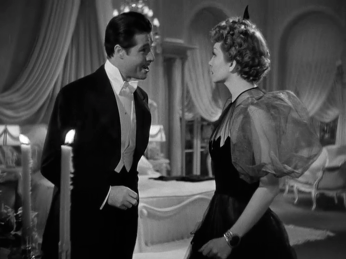
Ameche and Claudette Colbert in Midnight (1939)
Fortunately, the film doesn’t let this sexist arrangement pass totally uncritiqued. As one might expect, the movie eventually posits that one should combine rationality with emotion, and that it’s okay to be jealous sometimes because it means you care deeply. Plus, a man who can’t figure out when his coffee is cool enough to drink probably shouldn’t be given too much authority…Basically, neither Julie nor John are “right,” and their uneven relationship needs to change for them to be happy.
Anyway, back to the movie! The next day John gives Rubber-Legs another chance to pass the exam. It’s an absolute joke of a test, and it seems that even Rubber-Legs can pass it. But then Rubber-Legs mentions that the dean told him to pretend to have a headache if it gets too hard, and then the dean himself arrives to make sure Rubber-Legs doesn’t have a headache…basically, he is on the scene to ensure the kid passes. That’s the final straw for John. He quits.
 He can’t continue at a college that pretends to value academics but clearly is willing to bend the rules for its star athletes. (Again, isn’t it great how we have totally fixed this issue?)
He can’t continue at a college that pretends to value academics but clearly is willing to bend the rules for its star athletes. (Again, isn’t it great how we have totally fixed this issue?)
So John and Julie head to New York to try and get John’s book published. They arrive at a publishing house and are directed to Ms. Nellie Woods (Kay Francis), who is technically an assistant to the head guy but actually runs the whole business. She has read and loved John’s book, and unlike Julie, she actually gets the title right. Oh, dear.
Nellie and Julie are set up in opposition: Nellie is the smart, successful career woman (that Rosalind Russell usually plays), and Julie is the little wife who can’t understand her husband’s book. She even calls herself “not very clever and sort of un-mental” at one point in the movie! And John only encourages this characterization. He is incredibly patronizing to his wife but treats Nellie as a colleague.
Everything is going great until Nellie tells John that she wants him to focus the book solely on jealously in romantic relationships, not jealousy between classes, cultures, religions, etc. She also wants to change the title to “The Female of the Species” because it will sell better.
He is horrified at this major change, but Nellie explains that the book won’t sell otherwise. The two go off to chat and leave Julie alone.
But she immediately meets Elliott Morgan (Van Heflin), the titular head of the publishing house. Elliott is a silly, self-described neurotic who takes very little interest in his business, and definitely doesn’t want to read a dry tome like John’s book. Fun fact: Van Heflin’s shoes squeak in this scene, and I’m surprised they didn’t fix it during filming. It’s noticeable but never brought into the plot so I think it is accidental. That kind of thing doesn’t happen much in movies! Listen for it.
 Elliott doesn’t care about his job, but he’s very interested in Julie. In fact, he seems stunned by her beauty. (Another odd thing about this movie is that it keeps mentioning how gorgeous Julie is, and how she literally stops men in their tracks. But that’s a hard sell. She isn’t dressed in a glamorous or flashy way, and although Rosalind Russell is a beautiful woman, she isn’t a Marilyn Monroe/Gene Tierney/Rita Hayworth-style mankiller. She’s not a super-sexy pinup, so the movie’s attempted characterization seems forced.)
Elliott doesn’t care about his job, but he’s very interested in Julie. In fact, he seems stunned by her beauty. (Another odd thing about this movie is that it keeps mentioning how gorgeous Julie is, and how she literally stops men in their tracks. But that’s a hard sell. She isn’t dressed in a glamorous or flashy way, and although Rosalind Russell is a beautiful woman, she isn’t a Marilyn Monroe/Gene Tierney/Rita Hayworth-style mankiller. She’s not a super-sexy pinup, so the movie’s attempted characterization seems forced.)
Elliott continues “making time” with Julie even after he meets her husband. But of course John doesn’t care because he is above jealousy.
Meanwhile, Julie intuits that Nellie is in love with Elliott. So we get the age-old characterization of the successful career woman who wants the one thing she doesn’t have–a man! She would trade all of her success for a nice husband, but alas, her drive and unfeminine obsession with her work leaves her perpetually, unhappily, single. This theme is developed throughout the film, and is just one reason it hasn’t worn so well over the decades.
 Elliott invites Julie (and reluctantly includes John) to a literary tea at his apartment that evening. They show up and are awed by the strangeness of the New York literary scene. For example, Elliott points out a famous novelist and explains that “He’s found a wonderful formula for successful novels. All his rich characters are rats and everybody without a nickel is another Lincoln.” Topical!
Elliott invites Julie (and reluctantly includes John) to a literary tea at his apartment that evening. They show up and are awed by the strangeness of the New York literary scene. For example, Elliott points out a famous novelist and explains that “He’s found a wonderful formula for successful novels. All his rich characters are rats and everybody without a nickel is another Lincoln.” Topical!
Meanwhile, Julie is (inexplicably) the hit of the party because she is so gorgeous, and men keep drawing her away to woo her.
Elliott even tells John that he is very attracted to Julie. He has a complex that leads him to seduce married women to prove he is not inferior to their husbands. Or some nonsense. But John doesn’t mind. He tells Elliott to go ahead and pursue Julie because she would do him a lot of good. What?! He’s so smug.
Another thing that bugs me about John is that often when he introduces Julie he doesn’t even use her name, but just says “This is my wife.” Because that’s all that matters, I suppose.
Anyway, eventually Nellie shows up in the most ridiculous hat I’ve ever seen. Adrian, famed costume designer, took charge of the designs for this film. His signature angular tailoring and at times over-the-top details are on full display.
Nellie explains that they are going to publish John’s book, and she will be working closely with him over the next several weeks to make the revisions. That leaves Elliott free to seduce Julie…and if I were her, I would run off with funny, strange, rakish Elliott and leave her infuriating husband behind!
Nellie is in love with Elliott, but she recognizes that monogamy isn’t really for him. She’s used to watching him try to seduce ladies, so Julie is nothing new. John watches, too, though he is totally unconcerned. Meanwhile, a singer serenades them with a song called–you guessed it–“Jealousy!” It’s a very tense evening.
Elliott and Julie spend their days together sightseeing while Nellie and John work on the book.
It’s all very innocent, or is it? This is the cozy scene that greets Julie when she arrives home one afternoon. Of course John protests that they were just celebrating the end of their work on the book, but Julie is understandably upset. I don’t know why an editor and her author would need to cuddle quite so closely, particularly if one is married to someone else…
Naturally, Julie and John’s argument devolves into her being “emotional” and him being calmly rational. As usual. Finally John manages to convince Julie that she is just being silly and dumb. There is nothing going on between him and Nellie!
John is clearly missing the point though: Julie just wants to feel as though he cares about her and loves her. She wants to know that he would be upset if she ran away with another man. She doesn’t want him to be crazy possessive or quick to enrage any time a man looks at her, but it would be nice if he at least expressed his disapproval when another man flirted with her. His refusal to be jealous manifests as utter indifference. And that’s not what anyone wants from their spouse.
 After they make up, John and Julie decide to go out and celebrate the book, but before they get on the subway John gives Julie a seemingly irrelevant lesson in how to handle subway “mashers,” the guys who use a crowded subway as an excuse to molest women. Julie learns the phrase, “Get off me, bub, or I’ll call a cop!” in a New York accent.
After they make up, John and Julie decide to go out and celebrate the book, but before they get on the subway John gives Julie a seemingly irrelevant lesson in how to handle subway “mashers,” the guys who use a crowded subway as an excuse to molest women. Julie learns the phrase, “Get off me, bub, or I’ll call a cop!” in a New York accent.
But the pair rather stupidly continue practicing once onboard the train, and a cop hears Julie yell. He carts John away at the next station because they don’t believe that Julie was kidding. She can’t get off the train in time and ends up squished against an actual masher. It’s comically awful.
Meanwhile, Nellie goes to Elliott’s apartment. She realizes at once that he is waiting for another woman (Julie, whom he had invited earlier, though she had declined.) So she ends their strange relationship then and there. She’s tired of waiting for him to grow up.
He begs her to reconsider, but then Julie shows up. She has understandably come to Elliott for help getting John out of jail. Nellie skedaddles and Elliott deals with Julie.
He decides to take advantage of the situation, so he fakes a call to his lawyer and asks him to get John out of jail. He dials the “Time of Day” service where an operator announces, “When you hear the tone, the time will be…” and talks to the woman on the line as though she is the lawyer. (You may recall this device from Bringing Up Baby (1938), when Katharine Hepburn’s character pretends to be the speaking clock to annoy the people on the line.) For more on the time of day service, visit my History Through Hollywood: 3rd Edition.
So poor Julie hangs out at his apartment waiting for the lawyer to show up with her husband. Meanwhile, Nellie takes revenge on her immature boss/lover by calling all of their friends and inviting them to a “come as you are” party at Elliott’s apartment.
So people begin pouring through Elliott’s door in their jammies or evening attire. Nellie thus effectively, and cleverly, spoils Elliott’s romantic evening with Julie. Things really get crazy when Elliott’s lawyer shows up at the party. Elliott’s lie is thus exposed to Julie, and she leaves, furious.
But Elliott’s evening isn’t over. Nellie returns to see the chaos that she has wrought. But she finds a suitably chastened Elliott who is anxious to lock Nellie down, once and for all. “Losing” Julie seems to have changed him.
 He proposes and she accepts. Why? We don’t know. He’s a scoundrel. They plan to get married in the next few days (a very typical plan for the time), but first he is going to his island upstate to clean his house of all traces of the other women he has taken there. Nellie applauds him for the sentiment. At least she knows what kind of man he is?
He proposes and she accepts. Why? We don’t know. He’s a scoundrel. They plan to get married in the next few days (a very typical plan for the time), but first he is going to his island upstate to clean his house of all traces of the other women he has taken there. Nellie applauds him for the sentiment. At least she knows what kind of man he is?
Anyway, John is released from jail. That night, he admits to Julie that he basically “loaned” her to Elliott because he thought that she would be good for him. They have their old argument about jealousy. She tells him that he has a great system with great principles, but no heart, and she’s tired of it.
That night, she has a Salvador Dali-esque dream (compare it to the actual Dali-designed dream in Spellbound (1945)). She and John encounter her ex-boyfriend, Rubber-Legs, and Elliott. Instead of calmly ignoring all of these men, dream-John punches them out. It’s a delicious dream for Julie. But she wakes up to a husband who claims not to feel even the slightest twinge when men ogle, flirt, or even attempt to steal his wife. In fact, he encourages them!
Here is Russell between takes during the dream sequence:
The next morning Julie surreptitiously packs an overnight bag. She is going to teach John a lesson about the dangers of loaning one’s wife to other men. She pretends to go out and search for new apartments but instead heads to Elliott’s island. He had invited her there the day before, though she had initially refused, of course.
 Meanwhile, Nellie arrives at John’s apartment to tell him her great news. But a telegram arrives from Julie explaining that she has gone to Elliott’s island. This is a real bummer for Nellie, though John still seems totally unperturbed.
Meanwhile, Nellie arrives at John’s apartment to tell him her great news. But a telegram arrives from Julie explaining that she has gone to Elliott’s island. This is a real bummer for Nellie, though John still seems totally unperturbed.
He knows Julie is just pretending to run away with Elliott. She would never actually leave him! Ugh, he is so unlikeable. Be a human being, John!
John and Nellie head to the island. She goes to confront Elliott, and he goes to tear up the book contract. He doesn’t want to entrust his precious ideas to such depraved people.
Elliott is understandably shocked when Julie arrives, and he begs her to leave. But she doesn’t, so they all argue once everyone gets there. Through all of this, it’s hard to root for John because he never becomes a “hero.” In fact, I would have cheered if Julie had ended up finding someone who would treat her better. He takes her for granted in the name of “rationality,” but no one likes to be ignored, even if there is a philosophical reason for it.
John literally drags Julie away from the house. Her plan has failed—he never believed she was truly running away with Elliott. But he falls into the lake when he tries to step into the boat, and then he gets his necktie caught in the propeller. Now, that should also kill him, but instead he’s just pulled around the lake until the boat runs out of gas. It’s horrifying but it’s supposed to be funny. (The great Donald Meek plays the ferry man who brings all of these people to the island.)
After this misadventure, Julie makes up her mind. She is really, truly leaving John, and she tells him so. This finally wakes him up from his professorial stupor. He starts fighting with Elliott because suddenly he is jealous and assumes Elliott has stolen his wife.
But neither man is very good at fighting. It’s Bridget Jones sixty years early! I love realistic fights in movies. Of course neither John nor Elliott know how to throw a real punch! John had brought up the silliness of fighting earlier in the film, claiming that it’s not useful in modern life and that why should a professor like him know how to box, so it’s funny to see him try.
Anyway, as the women cheer their men, they end up fighting each other, too. It’s kind of a mess, but funny.
Their violent outbursts clear the air and reaffirm who loves whom. See, violence is the answer! Just kidding. Next thing we know, Elliott and Nellie are married. As they walk out of the courthouse, a man wolf-whistles at Julie, and John whirls around and chases him. He returns with a black eye, but boy, is Julie happy!
 As I mentioned, this film was in production from June 1-July 29, 1941, and premiered soon after in October.
As I mentioned, this film was in production from June 1-July 29, 1941, and premiered soon after in October.
Film Bulletin called the movie “quite entertaining. It is zany from start to finish, packed with a number of good gag situations and dialogue that sometimes borders on the hysterical…not a sensational picture, mind you, but a good comedy that will do above average business…”
The New York Times critic T.S. agreed that this movie was fine, but he thought it was due mostly to Rosalind Russell. He wrote: “If women are perverse creatures with only the thinnest veneer of civilization, that is precisely the quality that makes them charming—at least if one is to believe ‘The Feminine Touch’…As for ourselves, we prefer to believe it, especially when the lady in question is Rosalind Russell, as flip and adept a comedienne as is currently reading lines in Hollywood. As a matter of fact, the film has many too many lines, but they do have a sort of dizzy spin to them and Miss Russell knows how to deliver them mischievously. All in all, call it a lightly written conversation piece on the overworked subject of marital mix-up with Miss Russell in top form.”

Advertising strategies suggested in Showmen’s Trade Review, October 11, 1941. via: http://lantern.mediahist.org/catalog/showmenstraderev35lewi_0064
He seems to miss the point of the movie by remarking that, “For women, or so the moral goes, insist on cavemen, thus frustrating the male’s attempt to lift himself out of the primordial ooze.” Julie doesn’t wish her husband was a caveman; she just wants him to show more emotion, and seem at least a little miffed when men shower his wife with inappropriate attention.
T.S. continues, “Generally, we’re more than a little fatigued at the mere mention of another husband and wife fracas with a lecherous camera always sidling away to a bedroom door…But around a much-used topic Oppenheimer, Hartmann and Nash [the screenwriters] have dropped some chortling repartee, and Miss Russell swings through it with glee. She receives able assistance from Kay Francis, a lady with a torch, Van Heflin as the will-o’-the-wisp male who is escaping it, and even Don Ameche, who looks remarkably subdued in the role of the high-minded male. In fact, they all make ‘The Feminine Touch’ seem a little more novel than it really is.”
Any “novelty” has worn a little thin over the succeeding decades, in my opinion. This is a fine film, typical of the genre and the time, and enlivened thanks to Russell, Francis, and Heflin. But it’s not going to be on any Best lists. It seems very dated.
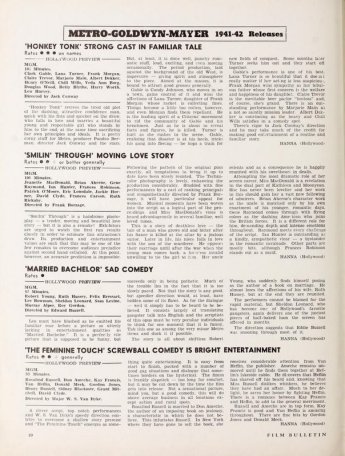
Film Bulletin, September 20, 1941. via: http://lantern.mediahist.org/catalog/filmbulletin194108film_0464
As for the cast, Ameche continued working steadily through the 1940s, though his career faltered a little in the ’50s. He came back to the screen in the 1960s and worked fairly often until the early 1990s. He was even nominated for an Oscar for Best Supporting Actor for Cocoon (1985).
Russell was just hitting her stride and continued working on screen and on stage through the early 1970s. Her second chapter is perhaps best remembered for her Tony-nominated performance in Auntie Mame on stage, and for receiving her fourth Oscar-nomination for her work in the film version in 1958. But her performance in Gypsy (1962) is a stunner, too. She was an incredible performer.
As I mentioned, Francis only made a few more movies after this one before retiring. But Heflin continued in Hollywood and made several memorable movies, including The Strange Love of Martha Ivers (1946), The Three Musketeers (1948), Shane (1953) and several other classic westerns.
Here’s the trailer for The Feminine Touch–enjoy! For more, follow me on Twitter, tumblr, Pinterest, Instagram, and Facebook. You can buy this movie here. As always, thanks for reading!
Categories: Comedy



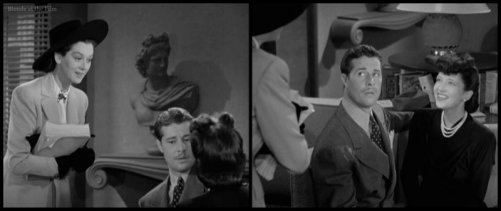
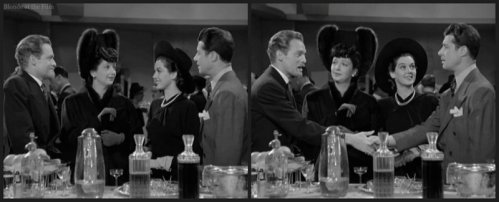
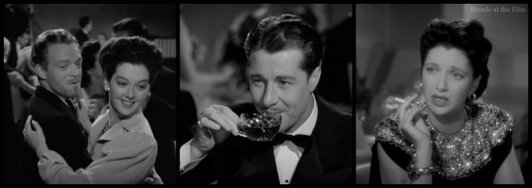


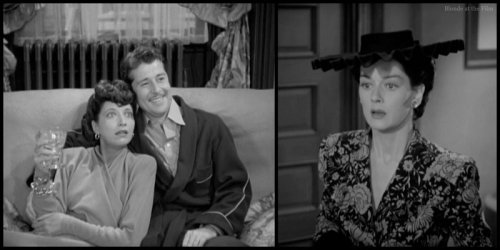

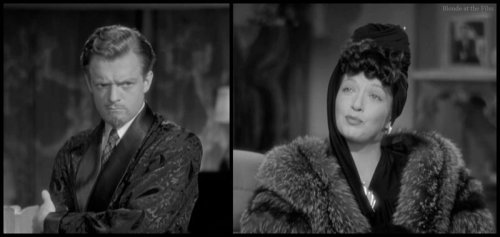
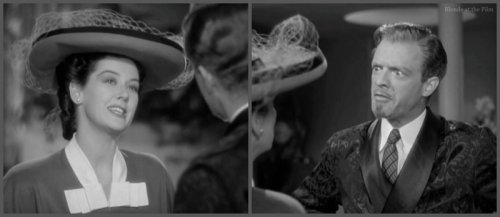
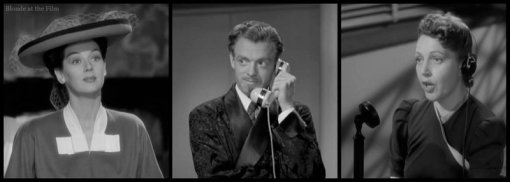
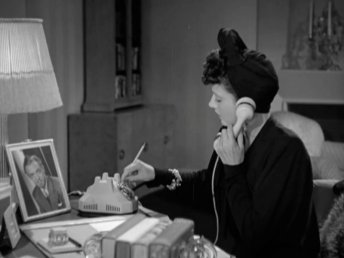
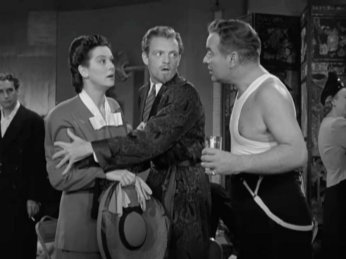

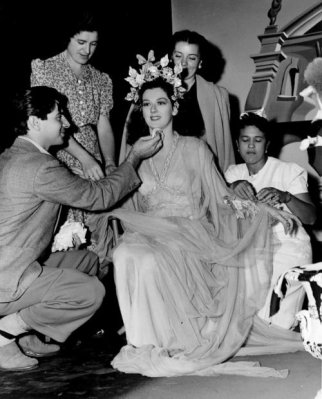
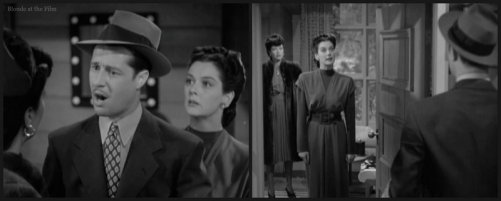
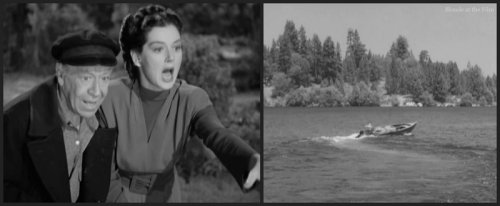


Had to get in a dig at UNC, didn’t you! Seriously, that is an ugly stain on everyone involved. I can say however, that when I caught one of my students from the football team in apparent academic dishonesty, he was treated the same as others with no direct pressure from the team.
“Come as you are parties” have been a comedy trope for a long time, I wonder if anyone’s actually held one, outside of fictional narratives?
Sorry about that…unfortunately, when you search for athletic/academic scandal, it’s all UNC right now. But they are certainly not alone. Good question about the “come as you are parties!” I wonder…
Oooh, I don’t know if I could stand watching a dumbed-down Rosalind Russell. Feels like sacrilege.
But your wickedly funny, link-studded commentary on how “plus ça change” the whole athletics/academics conflict is just about sold me.
Then again, I went to Syracuse. And we’ve never http://www.syracuse.com/orangesports/index.ssf/2015/03/ncaa_finds_syracuse_violated_drug_policy_committed_academic_fraud_gave_extra_ben.html ever https://www.insidehighered.com/news/2015/03/09/ncaa-suspends-syracuse-u-basketball-coach-vacates-108-wins had problems like that.
Haha thank you! I’m shocked–shocked I say!–to hear of any such modern scandals! wink. sigh. Thanks for this comment!
What a great review and synopsis of what seems, frankly, to be a rather odd and unsatisfying film. When one pauses to consider the output of Hollywood’s Golden Age, it’s inevitable that there will be some “misses” as well as “hits”. This sounds like the kind of film one might watch on a rainy Saturday afternoon and not want to bother seeing again. A shame, because Rosalind Russell was an outstanding comedienne. She wasn’t above a little vanity, though: at Columbia during the 40s she was the bane of head portrait photographer George Hurrell’s professional existence, constantly sending images back to be retouched, to make her look more youthful. “You’d retouch until you couldn’t put any more lead on the emulsion … My God, she wanted her face ironed out,” Hurrell later complained.
Cocoon was a bit hit when it came out in 1985 (it starred Steve Guttenberg, who was the cute, non-threatening man-of-the-80s-moment, after all), and I recall that Don Ameche’s Academy Award attracted a lot of attention. Do you think that viewing it today, thirty years on, it might easily slip into the same category as The Feminine Touch?
Yes, this is a movie that probably won’t become a favorite. Just like today, not every movie is a winner!
I love that story about Hurrell and Russell! I haven’t seen Cocoon in a long time and need to give it a rewatch. Do you think it has aged well?
Honestly? Would you believe I’ve never seen it? I was at a time in my life when any film newer than 1959 didn’t show on my radar. Perhaps I should take a look next time it’s on TV?
Thank you Cameron.
I’m a bit tired at the moment and not sure if you’ve found this site:
https://www.cinema.ucla.edu/
Best wishes,
James
UCLA Film & Television Archive http://www.cinema.ucla.edu About the Archive. Billy Wilder Theater. Watch & Listen Online
________________________________
Thank you!
Oh shucks, I really wanted to read your post, just looking at the photos was intriguing. But I haven’t seen the film yet, so I’m holding off till afterwards. My sister and I will try and watch it within the next two weeks, I can’t resist a Don Ameche film!
Don Ameche is pretty great! I hope you enjoy the movie–I’d love to know what you guys think about it!
Reblogged this on Eliza's Little Things and commented:
Thoroughly enjoyed this wonderful review. With all the fancifulness of the story, the movie was worth watching for the two actors – Rosalind Russell and Van Heflin. They have a knack of carrying the comedy with such finesse, the viewer expectantly waits for the next scene.
Quoting a line –
and if I were her, I would run off with funny, strange, rakish Elliott and leave her infuriating husband behind!
🙂 So true!
Your blog is a joy to explore. Thank you for this lovely post.
Thank you so much! I love how you describe Heflin and Russell. So right! Thanks for reading and I’m glad you enjoy my blog!